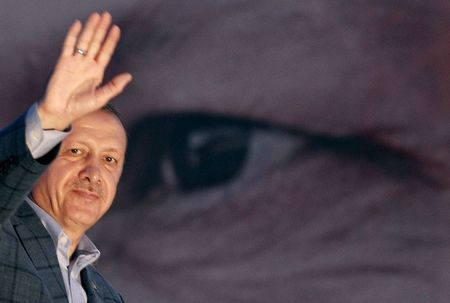Turkey’s Erdogan signals no let-up in push for stronger presidency

By Gulsen Solaker
ANKARA (Reuters) – Turkish president-elect Tayyip Erdogan signalled no let-up in his drive to strengthen the powers of the presidency on Thursday and vowed his battle against an Islamic cleric he accuses of plotting against the state would intensify once he took office.
In his first major speech since declaring victory in a presidential election on Sunday, Erdogan offered little sign that his fiery rhetoric and blunt approach to politics would soften after his inauguration on August 28.
His victory secured his place in history as Turkey’s first directly elected head of state and took him a step closer to the presidential system he covets for the European Union candidate nation and NATO member state.
His opponents fear an increasingly authoritarian state under Erdogan, who has dominated Turkish politics for more than a decade, and whose Islamist roots and intolerance of dissent they fear is taking Turkey further away from Western values.
Erdogan, who remains prime minister and leader of the AK Party until his inauguration, urged provincial AK leaders to remain focused on securing a stronger parliamentary majority next year to enable the party to re-write the constitution.
“I said before that the presidential elections would be the starting gun for the 2015 (general) elections,” he told the party meeting in a speech broadcast on Turkish television.
“Our target should be to acquire at least a majority to establish the new constitution. I don’t believe that you will compromise on this,” he said.
Erdogan will have to break formal links with the AK Party he founded 13 years ago once he is sworn in as president. He wants a pliant successor as leader of the party, likely also to be his next prime minister, in order to secure a stronger parliament majority in polls next June.
Should his influence over the party wane, Erdogan could struggle to force through the constitutional changes he wants to create an executive presidency – a reform which requires either a two thirds majority in parliament or a popular vote.
The AK Party currently holds 313 of parliament’s 550 seats, a strong majority but below the crucial two thirds threshold.
Erdogan founded the AK Party as a coalition of conservative religious Muslims, nationalists and reforming centre-right elements. He dismissed suggestions that the party he has dominated ever since could crumble without him, saying it drew its strength from the Turkish people.
“Those who thought our party would decline or fall apart have always been wrong,” he said.
“We have gone through challenging times in these 13 years. We have resisted, driven back, turned upside down all attacks on us. We have always been mandated by the people.”
“NEW EVIDENCE”
Erdogan’s victory on Sunday, in which he took almost 52 percent of the vote, came despite one of the most turbulent years of his leadership, with anti-government demonstrations last summer and a corruption scandal which erupted in December.
Erdogan accuses U.S.-based Islamic cleric Fethullah Gulen’s supporters in the judiciary and police of contriving the corruption investigation, which led to the resignation of three cabinet ministers, as part of a “judicial coup attempt”, a “dirty plot” to overthrow him.
Thousands of police officers and hundreds of judges and prosecutors have been reassigned in a purge of Gulen’s influence since then, with Erdogan accusing what he calls a “parallel structure” of a “vile betrayal” of Turkey.
Dozens more police officers, some of them high-ranking, were detained in the weeks before the presidential vote, accused of spying and illegally wire-tapping Erdogan and his inner circle.
“During the National Security Council meeting we made a decision about this. It’s entered into the official files under a code name. It’s an organisation that threatens our national security. We have new evidence, new files,” Erdogan said.
“(Their) targets are not Recep Tayyip Erdogan, his family, his colleagues, his friends. Their target is our independence, our flag, our country and our people.”
Gulen, whose followers say they number in the millions, denies using his worldwide Islamic movement to scheme against Erdogan from self-imposed exile in Pennsylvania, the U.S. state whose name Erdogan often uses to refer to the cleric’s network.
“You’ve seen how the crowds cheered when we said Pennsylvania. The people especially supported our fight against the gang of parallel traitors … We promised our fight would continue,” Erdogan said.
Gulen’s supporters in the judiciary and police are believed to have played a key role in helping Erdogan neuter rivals in the then dominant military and secular establishment through a series of high-profile court cases at the end of last decade.
But Erdogan’s alliance with Gulen’s Hizmet (Service) network crumbled due to disagreements on policy and government moves to rein in the movement. The rupture became public in December, when the corruption probe burst into the open.
(Additional reporting by Selin Bucak and Ece Toksabay; Writing by Nick Tattersall; Editing by Ralph Boulton)